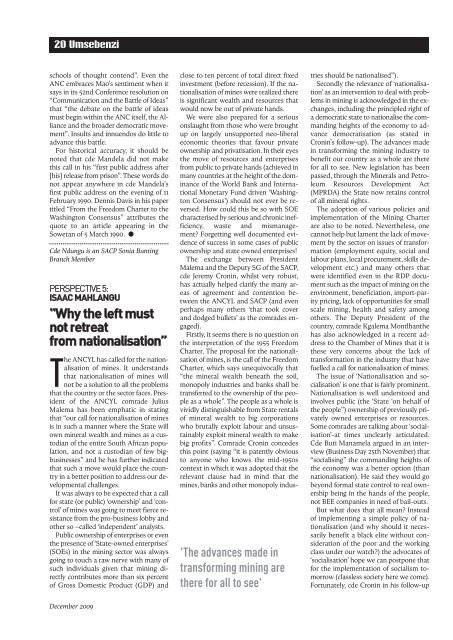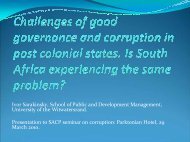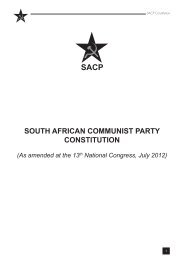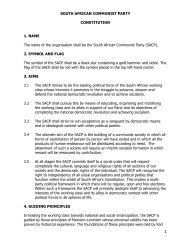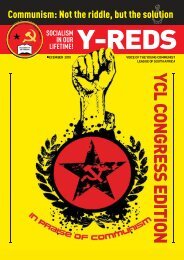Forward to Socialism!! - South African Communist Party
Forward to Socialism!! - South African Communist Party
Forward to Socialism!! - South African Communist Party
You also want an ePaper? Increase the reach of your titles
YUMPU automatically turns print PDFs into web optimized ePapers that Google loves.
20 Umsebenzi<br />
schools of thought contend”. Even the<br />
ANC embraces Mao’s sentiment when it<br />
says in its 52nd Conference resolution on<br />
“Communication and the Battle of Ideas”<br />
that “the debate on the battle of ideas<br />
must begin within the ANC itself, the Alliance<br />
and the broader democratic movement”.<br />
Insults and innuendos do little <strong>to</strong><br />
advance this battle.<br />
For his<strong>to</strong>rical accuracy, it should be<br />
noted that cde Mandela did not make<br />
this call in his “first public address after<br />
[his] release from prison”. These words do<br />
not appear anywhere in cde Mandela’s<br />
first public address on the evening of 11<br />
February 1990. Dennis Davis in his paper<br />
titled “From the Freedom Charter <strong>to</strong> the<br />
Washing<strong>to</strong>n Consensus” attributes the<br />
quote <strong>to</strong> an article appearing in the<br />
Sowetan of 5 March 1990.<br />
Cde Ndungu is an SACP Sonia Bunting<br />
Branch Member<br />
PERSPECTIVE 5:<br />
ISAAC MAHLANGU<br />
“Why the left must<br />
not retreat<br />
from nationalisation”<br />
The ANCYL has called for the nationalisation<br />
of mines. It understands<br />
that nationalisation of mines will<br />
not be a solution <strong>to</strong> all the problems<br />
that the country or the sec<strong>to</strong>r faces. President<br />
of the ANCYL comrade Julius<br />
Malema has been emphatic in stating<br />
that “our call for nationalisation of mines<br />
is in such a manner where the State will<br />
own mineral wealth and mines as a cus<strong>to</strong>dian<br />
of the entire <strong>South</strong> <strong>African</strong> population,<br />
and not a cus<strong>to</strong>dian of few bigbusinesses”<br />
and he has further indicated<br />
that such a move would place the country<br />
in a better position <strong>to</strong> address our developmental<br />
challenges.<br />
It was always <strong>to</strong> be expected that a call<br />
for state (or public) ‘ownership’ and ‘control’<br />
of mines was going <strong>to</strong> meet fierce resistance<br />
from the pro-business lobby and<br />
other so –called ‘independent’ analysts.<br />
Public ownership of enterprises or even<br />
the presence of ‘State-owned enterprises’<br />
(SOEs) in the mining sec<strong>to</strong>r was always<br />
going <strong>to</strong> <strong>to</strong>uch a raw nerve with many of<br />
such individuals given that mining directly<br />
contributes more than six percent<br />
of Gross Domestic Product (GDP) and<br />
close <strong>to</strong> ten percent of <strong>to</strong>tal direct fixed<br />
investment (before recession). If the nationalisation<br />
of mines were realized there<br />
is significant wealth and resources that<br />
would now be out of private hands.<br />
We were also prepared for a serious<br />
onslaught from those who were brought<br />
up on largely unsupported neo-liberal<br />
economic theories that favour private<br />
ownership and privatisation. In their eyes<br />
the move of resources and enterprises<br />
from public <strong>to</strong> private hands (achieved in<br />
many countries at the height of the dominance<br />
of the World Bank and International<br />
Monetary Fund driven ‘Washing<strong>to</strong>n<br />
Consensus’) should not ever be reversed.<br />
How could this be so with SOE<br />
characterised by serious and chronic inefficiency,<br />
waste and mismanagement?<br />
Forgetting well documented evidence<br />
of success in some cases of public<br />
ownership and state owned enterprises!<br />
The exchange between President<br />
Malema and the Deputy SG of the SACP,<br />
cde Jeremy Cronin, whilst very robust,<br />
has actually helped clarify the many areas<br />
of agreement and contention between<br />
the ANCYL and SACP (and even<br />
perhaps many others ‘that <strong>to</strong>ok cover<br />
and dodged bullets’ as the comrades engaged).<br />
Firstly, it seems there is no question on<br />
the interpretation of the 1955 Freedom<br />
Charter. The proposal for the nationalisation<br />
of mines, is the call of the Freedom<br />
Charter, which says unequivocally that<br />
“the mineral wealth beneath the soil,<br />
monopoly industries and banks shall be<br />
transferred <strong>to</strong> the ownership of the people<br />
as a whole”. The people as a whole is<br />
vividly distinguishable from State rentals<br />
of mineral wealth <strong>to</strong> big corporations<br />
who brutally exploit labour and unsustainably<br />
exploit mineral wealth <strong>to</strong> make<br />
big profits”. Comrade Cronin concedes<br />
this point (saying “it is patently obvious<br />
<strong>to</strong> anyone who knows the mid-1950s<br />
context in which it was adopted that the<br />
relevant clause had in mind that the<br />
mines, banks and other monopoly indus-<br />
'The advances made in<br />
transforming mining are<br />
there for all <strong>to</strong> see'<br />
tries should be nationalised”).<br />
Secondly the relevance of ‘nationalisation’<br />
as an intervention <strong>to</strong> deal with problems<br />
in mining is acknowledged in the exchanges,<br />
including the principled right of<br />
a democratic state <strong>to</strong> nationalise the commanding<br />
heights of the economy <strong>to</strong> advance<br />
democratisation (as stated in<br />
Cronin’s follow-up). The advances made<br />
in transforming the mining industry <strong>to</strong><br />
benefit our country as a whole are there<br />
for all <strong>to</strong> see. New legislation has been<br />
passed, through the Minerals and Petroleum<br />
Resources Development Act<br />
(MPRDA) the State now retains control<br />
of all mineral rights.<br />
The adoption of various policies and<br />
implementation of the Mining Charter<br />
are also <strong>to</strong> be noted. Nevertheless, one<br />
cannot help but lament the lack of movement<br />
by the sec<strong>to</strong>r on issues of transformation<br />
(employment equity, social and<br />
labour plans, local procurement, skills development<br />
etc.) and many others that<br />
were identified even in the RDP document<br />
such as the impact of mining on the<br />
environment, beneficiation, import-parity<br />
pricing, lack of opportunities for small<br />
scale mining, health and safety among<br />
others. The Deputy President of the<br />
country, comrade Kgalema Montlhanthe<br />
has also acknowledged in a recent address<br />
<strong>to</strong> the Chamber of Mines that it is<br />
these very concerns about the lack of<br />
transformation in the industry that have<br />
fuelled a call for nationalisation of mines.<br />
The issue of ‘Nationalisation and socialisation’<br />
is one that is fairly prominent.<br />
Nationalisation is well unders<strong>to</strong>od and<br />
involves public (the ‘State ‘on behalf of<br />
the people”) ownership of previously privately<br />
owned enterprises or resources.<br />
Some comrades are talking about ‘socialisation’-at<br />
times unclearly articulated.<br />
Cde Buti Manamela argued in an interview<br />
(Business Day 25th November) that<br />
“socialising” the commanding heights of<br />
the economy was a better option (than<br />
nationalisation). He said they would go<br />
beyond formal state control <strong>to</strong> real ownership<br />
being in the hands of the people,<br />
not BEE companies in need of bail-outs.<br />
But what does that all mean? Instead<br />
of implementing a simple policy of nationalisation<br />
(and why should it necessarily<br />
benefit a black elite without consideration<br />
of the poor and the working<br />
class under our watch?) the advocates of<br />
‘socialisation’ hope we can postpone that<br />
for the implementation of socialism <strong>to</strong>morrow<br />
(classless society here we come).<br />
Fortunately, cde Cronin in his follow-up<br />
December 2009


